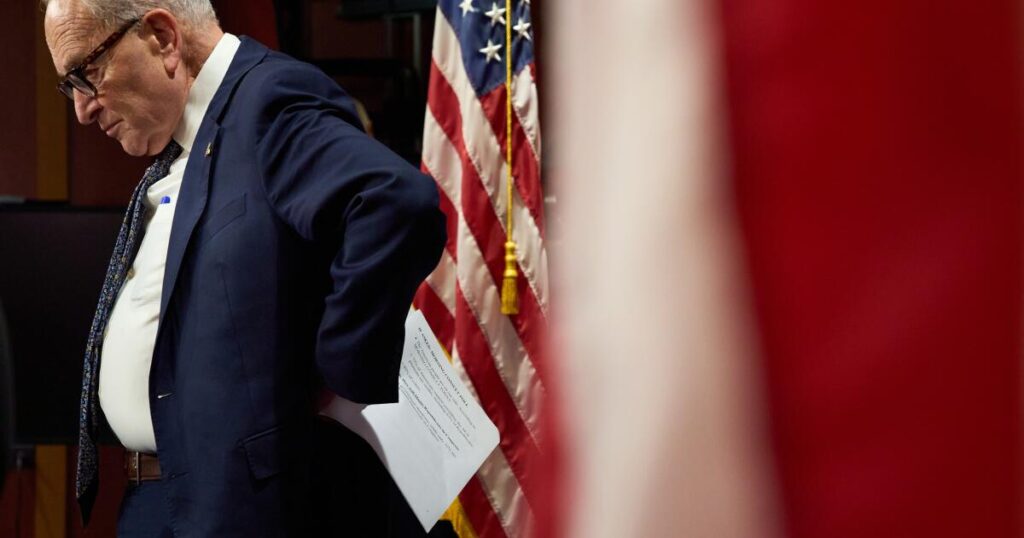WASHINGTON — Sen. Chuck Schumer of New York is facing mounting pressure to step aside as leader of the Senate Democratic caucus after eight members voted against his wishes Sunday, joining Republicans in a bid to end the longest government shutdown in history.
The vote was just the latest development in a troubling week for the 74-year-old Schumer, who, after eight years as the top Senate Democrat, has faced growing calls from within the party to make way for a new generation of leadership.
Elections last week revealed the emergence of a growing progressive movement in Schumer’s hometown, where the longtime senator declined to endorse Zohran Mamdani in his successful bid for New York City mayor.
National progressive organizations on Monday urged him to step down and have encouraged a popular congresswoman in the state, Rep. Alexandria Ocasio-Cortez, to run for his Senate seat in 2029. Polls show Schumer faces the lowest approval numbers of any national leader in Washington.
His leadership troubles come on the heels of Rep. Nancy Pelosi (D-San Francisco), the first female speaker of the House, announcing her retirement, a decision that generated praise across the political aisle last week reflecting on her shrewd ability to control a sprawling House Democratic caucus during high-stakes votes.
“Schumer is no longer effective and should be replaced,” Rep. Ro Khanna (D-Fremont) wrote on X after the Sunday night vote. “If you can’t lead the fight to stop healthcare premiums from skyrocketing for Americans, what will you fight for?”
Hakeem Jeffries of New York, the top Democrat in the House, told reporters Monday that he strongly disapproved of the emerging deal in the Senate, where seven Democrats and one independent who caucuses with the party voted to proceed with government funding.
For seven weeks, House and Senate Democrats said they would not vote for legislation to reopen the government unless they were able to secure an extension of health insurance subsidies. But the deal reached in the Senate indicated how some Democrats gave in on that bottom-line negotiation.
Schumer reiterated his disapproval of the spending deal in a speech from the floor Monday. He criticized the compromise as a “Republican bill” even though members of his party helped broker the deal.
“Republicans now own this healthcare crisis,” Schumer said. “They knew it was coming. We wanted to fix it and they said no, and now it is on them.”
As Schumer delivered his speech, Jeffries spoke to reporters at a news conference on the other side of the Capitol.
Asked whether he thought Schumer remained an effective leader and should remain in his position, Jeffries replied, “yes and yes.”
When pressed to elaborate, Jeffries said “the overwhelming majority of Senate Democrats led by Chuck Schumer waged a valiant fight,” and turned his disapproval to the Democrats who voted with Republicans on the bill.
“I am not going to explain what a handful of Senate Democrats have decided to do,” Jeffries said. “That’s their explanation to offer to the American people.”
Now that the effort turns to the House, Jeffries said Democrats in the chamber will try to block a deal that does not address healthcare costs.
California Gov. Gavin Newsom offered harsh criticism of Senate Democrats on Monday, who he said had “rolled over.”
After speaking at the Milken Institute’s Global Investors’ Symposium in São Paulo, Newsom told The Times that the move blunted the momentum his party was experiencing following a string of victories last week.
“You don’t start something unless you’re going to finish,” said Newsom, who next heads to the climate summit known as COP30 in Belém, Brazil. “Why the hell did we do this in the first place? We could have gotten this deal in 20 minutes. … Honestly, I don’t know what’s going on with my party.”
Zach Wahls, a Democratic candidate for Senate in Iowa, said Schumer had “failed to lead this party in one of its most critical moments,” calling for him to step down. And Rep. Seth Moulton, a Democrat from Massachusetts, wrote that an effective leader would have been able to keep party members in line.
“Tonight is another example of why we need new leadership,” Moulton wrote on X.
The eight members who voted to reopen the government — 15% of the Senate Democratic caucus — voted directly against Schumer, who voted against the measure.
Wahls speculated that the moderate members who voted with Republicans were privately given Schumer’s blessing to do so.
“The fact that he voted against this deal, while he clearly gave it his blessing in private, is a perfect illustration of why people no longer trust the Democratic Party,” Wahls said, “and as long as he stays in a leadership role, it is going to be impossible for anybody — whether it’s in Iowa or any other swing state — to win a majority.”
Times staff writers Wilner and Ceballos reported from Washington, and Gutierrez contributed from São Paulo.
